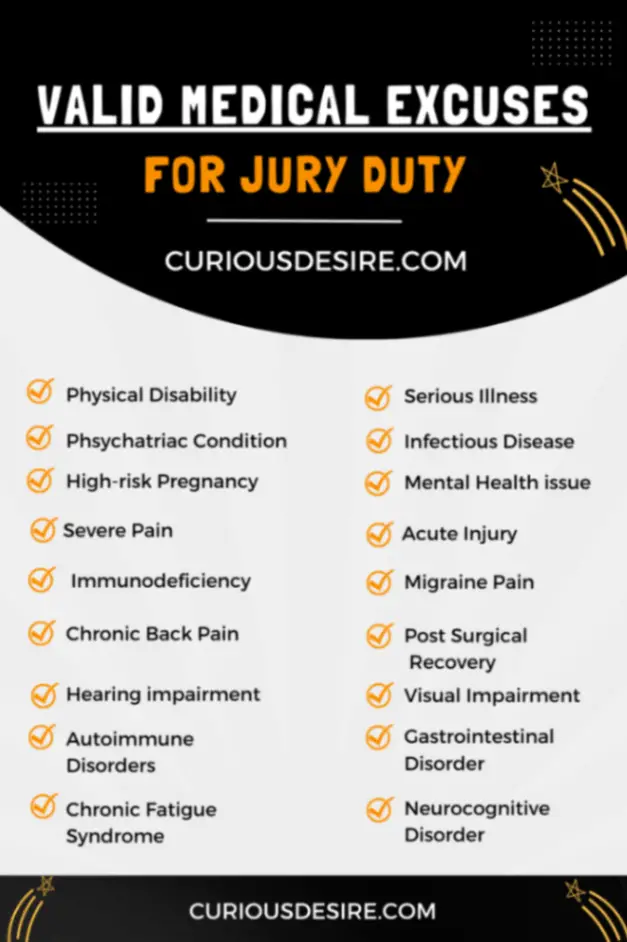Looking for a way to get out of jury duty? When it comes to fulfilling your civic duty while also maintaining your health and well-being, it’s essential to have a valid medical excuse.
In this blog, we’ll explore the ins and outs of valid medical excuses for jury duty, providing you with the knowledge you need to navigate this often tricky situation.
So, if you’re looking to learn how to approach the jury duty process with your health in mind, keep reading for essential insights and tips to help you through the process
5 Common Valid Medical Excuses for Jury Duty
- Severe Physical Disability
- Contagious Infectious Disease
- Severe allergies
- Severe side effects of medication
- Post-surgical recovery

1. Severe Physical Disability
A severe physical disability can significantly limit a person’s ability to participate in jury duty.
People with severe physical disabilities may have difficulty accessing the courthouse, sitting for long periods, or even filling out paperwork. The court needs to understand the unique challenges these individuals face when considering their ability to serve on a jury.

2. Serious Illness Requiring Hospitalization
Being hospitalized for a serious illness can make it impossible for someone to fulfill their jury duty obligations. They might be dealing with compromised immune systems, ongoing medical procedures, or significant physical limitations that prevent them from participating in the jury process.
The court must recognize the impact of serious illnesses requiring hospitalization on a person’s ability to serve on a jury.
3. Psychiatric Condition Requiring Inpatient Treatment
Severe psychiatric conditions requiring inpatient treatment can profoundly affect your ability to serve on a jury. You might be dealing with acute symptoms, medication adjustments, or intensive therapy sessions that make it impossible for you to participate in the jury process.
The court needs to understand the impact of these conditions on a person’s ability to fulfill their jury duty.
4. Contagious Infectious Disease
Contagious infectious diseases can pose a significant risk to others in a courtroom environment.
People with these conditions may be actively shedding infectious pathogens, making it unsafe for them to be near jurors, court staff, and other individuals in the courthouse. The court must recognize the public health implications of allowing people with contagious infectious diseases to participate in jury duty.
5. High-Risk Pregnancy
Pregnant women with high-risk pregnancies may be unable to fulfill their jury duty obligation. This could include women with conditions such as pre-eclampsia, gestational diabetes, or a history of preterm labor, which require close monitoring and medical care.
These women may require frequent medical appointments, close monitoring, or even strict bed rest to ensure a safe pregnancy outcome.
6. Severe Chronic Pain
People with severe chronic pain conditions may be unable to fulfill their jury duty obligation. These people struggle to manage their pain, perform basic activities of daily living, and engage in prolonged periods of focused attention.
This includes people with conditions such as fibromyalgia, severe arthritis, or neuropathic pain that significantly limits their ability to sit, stand, or concentrate for extended periods.
7. Terminal Illness
This includes people in the advanced stages of cancer, end-stage organ failure, or other life-limiting conditions with a prognosis of less than six months.
Terminal illnesses can profoundly affect physical and emotional well-being. The court needs to recognize the unique challenges and emotional strain faced by people with terminal illnesses when considering their ability to serve on a jury.
8. Acute Injury
Debilitating acute injuries can have a profound impact on a person’s physical and cognitive abilities. This could include people recovering from severe fractures, spinal cord injuries, or traumatic brain injuries that significantly impair their mobility, cognition, or ability to concentrate.
These individuals may be undergoing intensive rehabilitation, dealing with significant pain, or facing limitations in their mobility and dexterity which makes it difficult for them to perform jury duty.
9. Severe Immunodeficiency
Severe immunodeficiency disorders can leave people highly vulnerable to infections and other health complications. You may require strict infection control measures, frequent medical monitoring, or special accommodations to reduce your risk of exposure to infectious agents.
The court needs to recognize the unique health risks and challenges faced by people with severe immunodeficiency disorders when considering their ability to serve on a jury.
10. Severe Migraines
Some people suffer from intense and debilitating migraines that can make it difficult for them to concentrate or function normally.
These migraines may require rest in a quiet and dark environment to alleviate symptoms. Jury duty could exacerbate these symptoms and hinder the individual’s ability to fulfill their civic duty effectively.

11. Autoimmune Disorder Flare-Up
For people with autoimmune disorders such as lupus, rheumatoid arthritis, or multiple sclerosis, stress and disruptions to routine can trigger painful flare-ups and exacerbate the symptoms.
Attending jury duty during a flare-up could lead to increased discomfort and reduced functionality, making it challenging to actively participate in the court proceedings.
12. Uncontrolled Diabetes
People with uncontrolled diabetes may struggle with fluctuating blood sugar levels, causing symptoms such as fatigue, dizziness, and difficulty concentrating.
Failing to manage these symptoms can lead to serious health complications. Attending jury duty under these circumstances could pose a risk to your health and well-being.
13. Chronic Back Pain
Chronic back pain can significantly limit mobility and cause discomfort, making it challenging for you to sit for prolonged periods.
The jury duty setting may not accommodate your need to adjust positions frequently or take necessary breaks for pain management, which could hinder your ability to fulfill your civic responsibilities effectively.
14. Anxiety or Panic Disorder
If you’re suffering from severe anxiety or panic disorder you may experience overwhelming feelings of fear and distress in unfamiliar or crowded environments.
The pressure and scrutiny associated with jury duty could trigger intense anxiety or panic attacks, impairing your ability to contribute meaningfully to the legal proceedings.
Source: Don’t Panic, Do This! YT Channel
15. Severe Allergies
People with severe allergies to environmental triggers, such as pollen or certain chemicals, may experience allergic reactions that can range from mild discomfort to life-threatening conditions.
The courtroom environment may expose them to allergens that could provoke severe allergic reactions, jeopardizing their health and safety.
16. Post-surgical Recovery
People who have recently undergone surgery require adequate time for rest and recovery to allow their bodies to heal properly.
Participation in jury duty during the critical post-operative period could impede their recovery process and potentially lead to complications or setbacks in their health.
17. Severe Side Effects of Medication
These side effects could impair your cognitive function, physical stamina, or overall well-being, making it challenging for you to actively engage in the jury duty process.
Serving on a jury while experiencing such side effects could compromise your ability to contribute effectively to the legal proceedings.
18. Severe Chronic Fatigue Syndrome
Chronic fatigue syndrome (CFS) is a complex disorder characterized by extreme fatigue that cannot be explained by any underlying medical condition.
People with severe CFS may experience profound exhaustion, cognitive difficulties, and widespread pain. Serving on a jury could exacerbate these symptoms, making it challenging to consistently participate in court proceedings and fulfill their civic duty effectively.
19. Severe Gastrointestinal Disorders
People with severe gastrointestinal conditions such as Crohn’s disease or ulcerative colitis may experience unpredictable and debilitating symptoms, including severe abdominal pain, diarrhea, and fatigue.
The nature of these disorders requires urgent access to restroom facilities and accommodation for dietary restrictions, making it difficult for them to fully engage in jury duty without compromising their health and well-being.
20. Hearing Impairment
People with profound hearing loss or severe hearing impairment may face significant challenges in fully understanding and participating in courtroom proceedings.
Without appropriate accommodations, their ability to effectively serve as a juror and contribute meaningful input to legal deliberations may be compromised, warranting exemption from jury duty.
21. Visual Impairment
Severe visual impairment or blindness can create significant barriers to fully participating in the visual aspects of the jury trial process.
Without appropriate accommodations, people with severe visual impairment may struggle to engage in visual evidence, observe non-verbal cues, or navigate the courtroom environment effectively, impacting their ability to fulfill their role as jurors.
22. Severe Chronic Skin Conditions
Severe chronic skin conditions such as psoriasis, eczema, or severe allergic dermatitis cause intense discomfort, itching, and pain that can be exacerbated by stress and environmental factors.
The confined and potentially stressful environment of the courtroom may worsen these symptoms, impacting focus and ability to actively participate in jury duty.

23. Severe Neurocognitive Disorders
Severe neurocognitive disorders, such as advanced Alzheimer’s disease or other forms of dementia, may significantly affect cognitive impairment that affects memory, reasoning, and ability to comprehend complex legal proceedings.
This requires specialized care and support, making it challenging for people to serve as effective jurors without jeopardizing their well-being.
24. Severe Post-traumatic Stress Disorder (PTSD)
Individuals suffering from severe PTSD experience intense and distressing psychological symptoms, including flashbacks, hypervigilance, and significant anxiety.
The courtroom environment, including potentially triggering testimonies or legal proceedings, may exacerbate their symptoms, making it difficult for them to actively engage and contribute to jury duty.
25. Severe Musculoskeletal Limitations
Certain people may have severe musculoskeletal limitations due to conditions such as severe osteoarthritis, advanced degenerative disc disease, or paralysis.
These limitations may significantly impair mobility, making it challenging for individuals to navigate the courtroom setting or sit for prolonged periods, hindering their ability to fulfill the physical demands of jury duty.
Conclusion
It is imperative to acknowledge that genuine health limitations can hinder a person’s capacity to fulfill jury duty, and as such, understanding and accommodating valid medical excuses is essential in upholding the principles of justice and fairness.
Moving forward, we hope that the legal system continues to evolve in its recognition and consideration of the myriad health circumstances faced by prospective jurors. By fostering greater awareness and empathy, we can contribute to a judicial environment that respects and accommodates the health needs of individuals, while maintaining the integrity of the jury selection process.
Valid Medical Excuses for Jury Duty FAQs
1. What qualifies as a valid medical excuse for jury duty?
A valid medical excuse for jury duty typically involves a significant medical condition that prevents you from fulfilling your jury duty obligations. This may include physical or mental health issues that make it difficult or impossible for you to participate in the jury process.
2. Can I request a medical excuse for jury duty if I am pregnant?
Pregnancy-related complications or conditions that make it difficult or unsafe to serve on a jury can qualify as a valid medical excuse. It’s important to consult with your healthcare provider and obtain appropriate documentation to support your request.
3. How do I request a medical excuse for jury duty?
To request a medical excuse for jury duty, you typically need to contact the court that summoned you for jury duty and provide documentation from a healthcare professional outlining your medical condition and its impact on your ability to serve.
4. Can I be excused from jury duty if I have a mental health condition?
Yes, if you have a mental health condition that significantly impairs your ability to serve on a jury, it can serve as a valid medical excuse. It’s important to obtain a detailed explanation from a mental health professional to support your request.
5. Can chronic pain be considered a valid medical excuse for jury duty?
Yes, chronic pain that severely limits your ability to participate in jury duty can be considered a valid medical excuse. It’s important to provide detailed documentation from your healthcare provider outlining the nature and severity of your chronic pain.
6. What if I have a medical condition that requires me to take frequent medication?
If you have a medical condition that requires you to take frequent medication, and the timing or side effects of the medication would significantly impact your ability to serve on a jury, it can serve as a valid medical excuse. Documentation from your healthcare provider outlining the medication schedule and its impact on your ability to serve may be necessary.
7. What if I have a medical condition that requires me to avoid certain environmental conditions, such as exposure to chemicals or extreme temperatures?
If you have a medical condition that requires you to avoid certain environmental conditions, such as exposure to chemicals or extreme temperatures, it can be considered a valid medical excuse for jury duty. Documentation from your healthcare provider outlining the environmental restrictions and their impact on your ability to serve may be necessary.